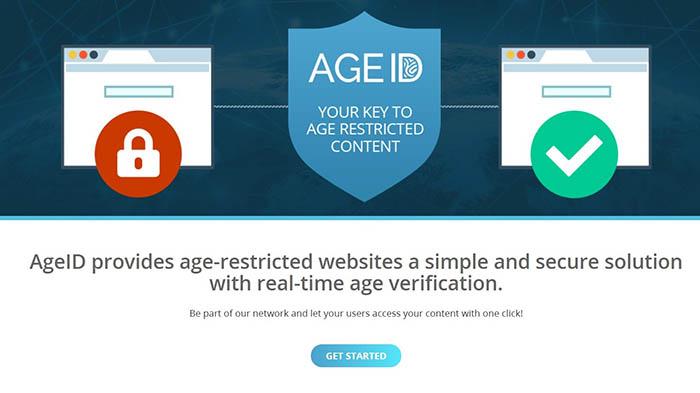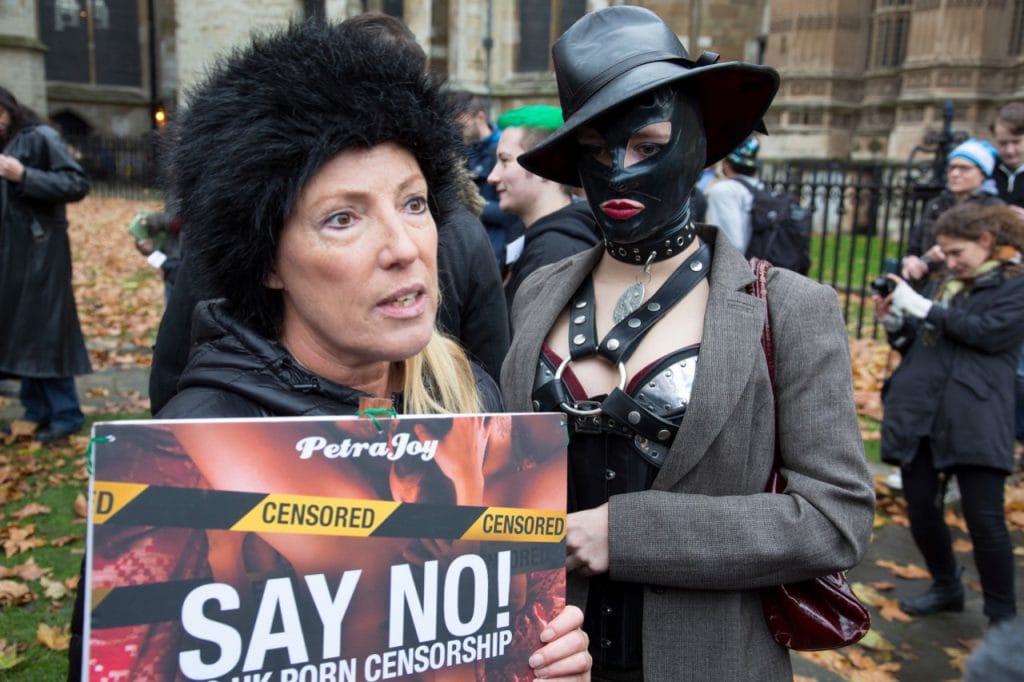A new law has the potential to pose a severe threat to the anonymity of people in the UK.
This statement was originally published on indexoncensorship.org on 11 April 2019.
There is a tired stereotype that the British don’t “do” sex. It’s too embarrassing, too shocking to be talked about in public spaces. The cliché has long been considered outdated in the wake of the obscenity trials of the mid-1960s when works such as Lady Chatterley’s Lover were vindicated. And, so the story goes, the road has paved the way to a more permissive society.
Yet with the passage of the UK’s Digital Economy Act 2017, this could all be about to change. The act, created by the Department of Digital, Culture, Media and Sport, mandates – among other things – that all pornographic websites have strong age verification checks. Ostensibly created to safeguard children from pornography, these checks would require users to either purchase a special “porn pass” in a physical shop or submit official forms of documentation to private companies for verification.
This age verification scheme has been repeatedly delayed, most recently on 1 April 2019. However, it has not been taken off the table, with the government still working to roll out the scheme sometime in the near future. This is despite the policy having been met with criticism by many anti-censorship and privacy campaigners, who see it as setting an unhealthy risk to online anonymity, net neutrality and sexual freedom.
The law has the potential to pose a severe threat to the anonymity of people in the UK.
Jodie Ginsberg, CEO of Index on Censorship, explains: “This plan is riddled with problems. As David Kaye, the UN’s Special Rapporteur on the promotion and protection of the right to freedom of opinion and expression has said, identity disclosure requirements in law allow authorities to identify people more easily, which threatens anonymous expression.”
David Kaye has long been a vocal critic of violations of net neutrality such as the UK’s “porn ban”, which can have a severe cooling effect on the public’s ability to express themselves freely.
He states that: “The internet has profound value for freedom of opinion and expression, as it magnifies the voice and multiplies the information within reach of everyone who has access to it. Within a brief period, it has become the central global public forum. As such, an open and secure internet should be counted among the leading prerequisites for the enjoyment of freedom of expression today.”
According to Kaye, any requirement for the disclosure of identity or to obtain an officially recognised documentation to access pornography would allow authorities to identify people more easily, and threatens that kind of anonymous expression. Similarly, creating legally sanctioned barriers which severely restrict access to online content such as pornography would be harmful to individuals’ right to expression.
The law will be overseen by the British Board of Film Classification, the 107-year-old organisation responsible for age ratings on films, which among other things rated Watership Down – a 1978 British animated adventure-drama film replete with violent scenes of rabbits ripping each other’s throats out – “U” for universal, or suitable for all. However, the actual enforcement of it will be left to private “age verification” companies.
The systems currently being prepared for use after the scheme is rolled out by companies such as AgeID and AgeChecked typically require the user to provide formal, high-risk personal identification such as a passport, driver’s licence or credit card. Once sufficient identification is provided, users will be granted access to all websites that use them. However, by forcing users to provide sensitive personal data to access websites, these systems hold the potential to accrue vast amounts of data about people, including names, addresses, bank details and sexual preferences.
Yet with AgeID – the company expected to dominate the UK Age Verification market – being owned by pornography giant MindGeek, this risk may only be enhanced. MindGeek is also the parent company of PornHub, YouPorn and RedTube, and may represent a strong conflict of interest.
As Jim Killock, executive director of the Open Rights Group, explains: “The porn company MindGeek will become the Facebook of age verification, dominating the UK market. They would then decide what privacy risks or profiling take place for the vast majority of UK citizens.”
“The government has repeatedly refused to ensure that there is a legal duty for age verification providers to protect the privacy of web users,” Killock adds. “Age verification could lead to porn companies building databases of the UK’s porn habits, which could be vulnerable to Ashley Madison style hacks.”
The risks of these databases being hacked is a distinct possibility. [For example, there was] the 2015 Ashley Madison data breach, in which hackers exposed the names, email addresses, phone numbers and credit card details of users of the dating site whose slogan was “Life is short. Have an affair”.
Subsequent to the breach, exposed users found themselves at risk of losing careers, broken marriages and extortion or suicide, as in the case of John Gibson, a pastor at the New Orleans Baptist Theological Seminary whose suicide note mentioned the data breach.
For one vocal critic, Clarissa Smith, professor of sexual cultures at the University of Sunderland, the law seems like an ineffective attempt for the government to appear to be addressing a largely manufactured issue. She argues that the resulting law ultimately doesn’t even address the underlying problems which it claims to address.
“As is often the case with this kind of legislation, it was rolled into a portmanteau bill, and the age verification provisions were barely discussed because they’re just one aspect of the bill,” Smith said. The legislation then passed, and most people are unaware that the provisions were even there. “Those that do take note are often dismissed as the cranks or perverts ‘who don’t care about children’.”
“The result is that broader problems about data security, rights to privacy and sexual freedoms are all swept away in the name of ‘doing something for the kids’,” she added. “And people ignore this kind of legislation because they presume it won’t apply to their own sex lives, or that if they don’t watch much porn they won’t be affected.”
The issue, Smith argues, is not that pornography is accessible, but that it is not talked about with young people, except to discourage them from seeking it out.
“I think there are lots of more productive ways of dealing with adult concerns about what young people are viewing online. Too often they turn straight to protection, prevention and prohibition when what could be done would be to offer education and support so that kids make the right choices for themselves.”
According to Jerry Barnett, campaigner and author of Porn Panic!: Sex and Censorship in the UK, the regulation of the porn industry is a sign of greater underlying threats to net neutrality. For Barnett, the problems with the age verification system, though still significant, pale in comparison to the government’s power to block porn websites outright if they don’t comply with the law. He says that allowing the government to block non-compliant porn sites could set a dangerous precedent for other forms of online censorship in the future.
“While the discussion has centred on the ‘age verification’ requirement, the real problem comes with the blocking system that will be used to prevent UK citizens accessing non-compliant sites,” Barnett says. “That should be the focus of civil liberties campaigners, as it can be used to block anything.”
“The burning issue is that a ‘Great Firewall of Britain’ has been quietly built using the age verification requirements as an excuse, he adds. “The blocking system, rather than the age verification system, will fundamentally change the nature of the internet.”
The Digital Economy Act permits the BBFC to block porn websites which do not comply with their regulations, as well as allowing them to impose fines of up to £250,000 upon them as an alternative.
Barnett argues that if the law had not been specifically targeted at pornography, a law such as the Digital Economy Act would have been the subject of strong public debate, such as the recent discussion surrounding Article 13, the EU’s new copyright directive. Like Smith, he suggests that such debate struggled in the face of the strong cultural stigma which surrounds sex and pornography.
“The issue requires someone who will ‘defend the indefensible’ in the media, and there aren’t many of us around,” he says. “In order to oppose censorship, you find yourself defending things – such as the right of teenagers to access sexual content – that few people are prepared to defend.”
Despite the many issues which plague the law, the vast majority of the UK population is apparently unaware of it. According to a poll conducted by YouGov published on 18 March, less than a month before the new regulations were due to be rolled out, only 24% of Britons were aware of the new law – or what it entailed.
The same study found that 67% of those surveyed supported the changes after being informed of the law – including over a quarter of those who viewed pornography most frequently.
Seemingly, even many people who in private would be hit hardest by the new measures support them due to the social stigma of being opposed to them.
Of course, one of the largest problems which the government will face if the legislation ever becomes officially enforced – and a likely reason why the law has been repeatedly delayed – are virtual private networks such as NordVPN, HideMyAss! and Cyberghost, which allow users to browse the internet anonymously, and even appear to be doing so from a country completely different to their actual location.
With the UK being the only democratic country to so far attempt to block pornography, the “Great Firewall” is likely to be one with many holes in it.




